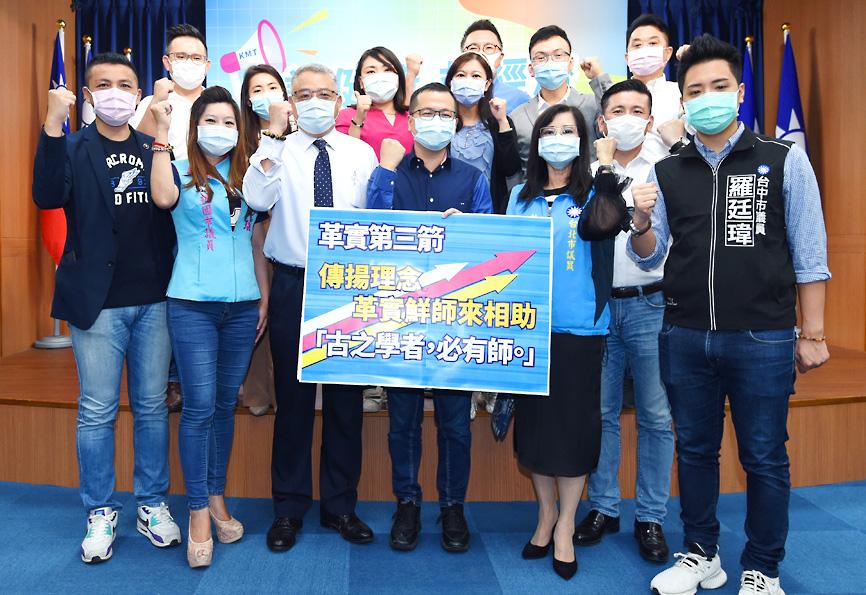Chinese Nationalist Party (KMT) legislators Chiang Wan-an (蔣萬安), Hung Mong-kai (洪孟楷) and William Tseng (曾銘宗) are on a list of 20 party members joining the KMT’s Institute of Revolutionary Practice as “teachers,” the KMT announced yesterday.
Institute director Lo Chih-chiang (羅智強) said that he would continue to look for more people, including KMT members and outside experts in various fields, to join the institute as teachers.
He called it a “training unit.”

Photo: Liao Chen-huei, Taipei Times
New Taipei City Councilor Chen Wei-chieh (陳偉杰), a teacher at the institute, said he hopes it will attract more young people to the party.
While in the past the institute focused on training young people within the KMT, it now invites everyone to take part in its events, Taipei City Councilor Chin Hui-chu (秦慧珠) said.
Lo said that the institute is to hold its first event tonight — the first in a series of talks called “Future Salon.”
The discussion is to feature former president Ma Ying-jeou (馬英九) and KMT Chairman Johnny Chiang (江啟臣), he said, adding that it is to be livestreamed online from 8pm to 9pm.
The topic is the future of Taiwan after the COVID-19 pandemic, he added.
Institute teachers are to speak in future discussions, Lo said, adding that in addition to two main speakers, discussions would also include a host, an expert and three to five young audience members.
Formerly named the National Development Research Institute, the institute reverted to its original name in 2017.

The Grand Hotel Taipei on Saturday confirmed that its information system had been illegally accessed and expressed its deepest apologies for the concern it has caused its customers, adding that the issue is being investigated by the Ministry of Justice Investigation Bureau. The hotel said that on Tuesday last week, it had discovered an external illegal intrusion into its information system. An initial digital forensic investigation confirmed that parts of the system had been accessed, it said, adding that the possibility that some customer data were stolen and leaked could not be ruled out. The actual scope and content of the affected data

‘LIKE-MINDED PARTNER’: Tako van Popta said it would be inappropriate to delay signing the deal with Taiwan because of China, adding he would promote the issue Canadian senators have stressed Taiwan’s importance for international trade and expressed enthusiasm for ensuring the Taiwan-Canada trade cooperation framework agreement is implemented this year. Representative to Canada Harry Tseng (曾厚仁) in an interview with the Central News Agency (CNA) said he was increasingly uneasy about Ottawa’s delays in signing the agreement, especially as Ottawa has warmed toward Beijing. There are “no negotiations left. Not only [is it] initialed, we have three versions of the text ready: English, French and Mandarin,” Tseng said. “That tells you how close we are to the final signature.” Tseng said that he hoped Canadian Prime Minister Mark Carney

President William Lai (賴清德) yesterday bestowed one of Taiwan’s highest honors on Saint Vincent and the Grenadines (SVG) Ambassador Andrea Clare Bowman in recognition of her contributions to bilateral ties. “By conferring the Order of Brilliant Star with Grand Cordon on Ambassador Bowman today, I want to sincerely thank her, on behalf of the Taiwanese people, for her outstanding contribution to deepening diplomatic ties between Taiwan and SVG,” Lai said at a ceremony held at the Presidential Office in Taipei. He noted that Bowman became SVG’s first ambassador to Taiwan in 2019 and

A man walks past elementary school artworks at the Taipei Lantern Festival in Ximen District yesterday, the first day of the event. The festival is to run from 5pm to 10pm through March 15.